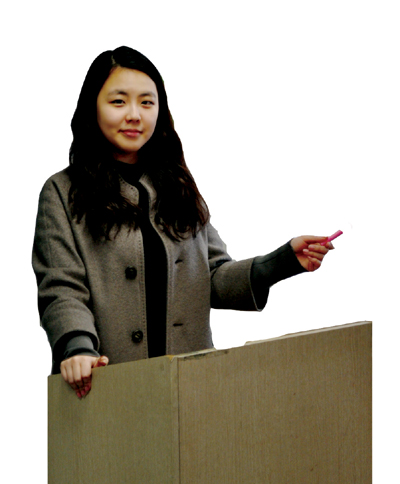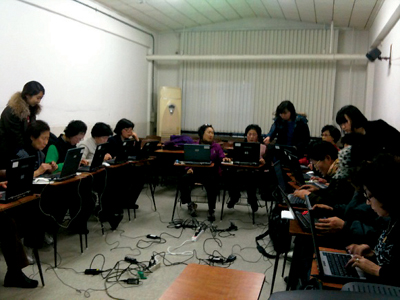When young teachers meet old students: the “Labor Class”

* Chi Ha-lim (Law, 4) (above) has been a tutor for young single mothers at Aeranwon since December 2009. Like her, there are some Ewha students who decided to volunteer as tutors other than administrative helpers or cleaners, for they wanted to provide chances to those who were deprived of opportunities to learn - which they have enjoyed until now.
For this issue, Ewha Voice has focused on student tutors at the Labor Class and Aeranwon. The Labor Class is run by Ewha students to assist Ewha’s janitors to pursue their missing education. The volunteering students of Aeranwon teach single mothers who had to drop out of school because of their condition.
“I think that university students can effectively utilize their skills by volunteer tutoring,” said Lee Mi-yang, a member of Ewha Social Service Center. “Through these volunteer activities they can fully participate with their own capabilities and earn satisfaction for not only the students they teach, but also for themselves.”
Every Tuesday and Thursday, the sound of rapid typing streams through the chinks of a classroom door in the Ewha-POSCO Building. Students follow the teachers’ instructions, such as moving their mouse on the screen or scanning for English letters on the keyboard. Some students just have started learning computer skills late in their fifties, and some are quite fast for two-fingered typists.
One of the most unique scenes of this class is that the teachers are much younger than students and they are, in fact, Ewha students. The class consists of 15 students, who work as janitors at Ewha, and three teachers who are studying at Ewha. This unique class, named the “Labor Class,” provides janitors the chance to learn Korean and teaches them how to use a computer as a free education service.
In 2010, Yonsei University started the Labor Class, and as they suggested Ewha students establishing a similar kind of classes, the Ewha Labor Class was established in September of that same year. In each of the classes, university students became the teachers for the janitors; there are currently 21 janitors now participating in the classes with nine Ewha students.
Teachers and students of the Labor Class have special names for each other: Kang-hak and Hak-kang. The teachers are called Kang-hak, which means, one teaches like one learns; and vice versa, janitor-students are called Hak-kang, which means one learns like one teaches. These names show the Labor Class’s core value: interaction.
There is one student in the Korean class who has a strong regional Korean accent. When she took the Korean dictation test, she used to listen to the teacher’s pronunciation and then repeated the words out loud before writing down her answers. This made her dictation scores lag somewhat behind since all of her answers were written in her dialect.
“She was very frustrated but the situation itself was very fun. I could remember her right away due to that circumstance,” said Kim Moon-Jin (Special Education, 2), a representative of the Labor Class who teaches Korean to the laborers.
Another episode that speaks to the unique atmosphere of the classes was the so-called “snack competition.” Students sometimes brought small-sized fruits as snacks to share. However, in time the kinds and sizes of snacks increased and become more varied; apparently there was some sort unspoken competition going on among the students. Thanks to the different kinds of snacks, the classes became more enjoyable for all.
The curriculum of Korean classes consists of daily information that is useful in the everyday lives of the students.
“Last year, we provided basic knowledge which is routinely used such as dealing with bank accounts, sending packages via the post office, and even writing Christmas cards,” Kim said. Since it was obvious that learning these practical skills as well as Korean is useful to the janitors, the class ended with great satisfaction for both teachers and students.
While there can be a one-to-one student/teacher ratio in the Korean classes, one teacher has to teach several students in computer class. At first, students were not good at turning on a computer and they had absolutely no knowledge about computers. Therefore, the elder students had to first learn the English alphabet and the way to use a mouse and the keyboard before they could learn how to use the Internet.
“The teachers are teaching us very kindly how to use a computer and it is little challenging but very interesting. Now, many students and I can distinguish upper case letters from lower case letters,” said Lee Min-do, a student from the computer class.
The students once wrote letters to their family members, including their husbands and children using the Microsoft Word program. After finishing writing the letters, the teachers had them print out and put the letters in the envelopes. Among the students, one woman in her early sixties wrote a letter to her grandchild. In the letter she said: “I am so happy watching you growing up adorably. I love you so much from the bottom of my heart.” At the moment of writing letters, all letter writers were immersed in their emotion.
Now, the students in computer class are learning how to use the Internet and search engines. Students search through newspaper articles for stories about janitors on the Internet, and one of the students was amazed to find an article that quoted her with her name in it.

Despite several difficulties during the classes, all of the students express gratitude to the teachers for their efforts by shaking and holding teachers’ hands when the class is over.
“Teachers prepare many laptop computers and engage a room in Ewha’s campus for us. We are sorry to bother them each time,” said Lee Soon-won, one of the janitor-students.
However, Ewha students who take on the role of teacher feel happy during the class and they confessed that they come to know the real meaning of volunteering through the Labor Class.
“The fact that I can be of service to someone makes me get feel more mature. The janitors’ affection and passion for learning energize me,” said Cheon Jee-won (Economics, 3), who teaches in the computer class.
“There were 20 students in computer class at the beginning of this semester; however, only 10 students are left due to the janitors’ extended strike on Ewha’s campus,” said the representative Kim Moon-jin. “Because of this unstable situation, it is difficult to predict how many students will be able to attend classes next week. We hope not only Ewha janitors but also other janitors in Sinchon will join us. We aim towards the statement of providing janitors with more opportunities to learn something.”

